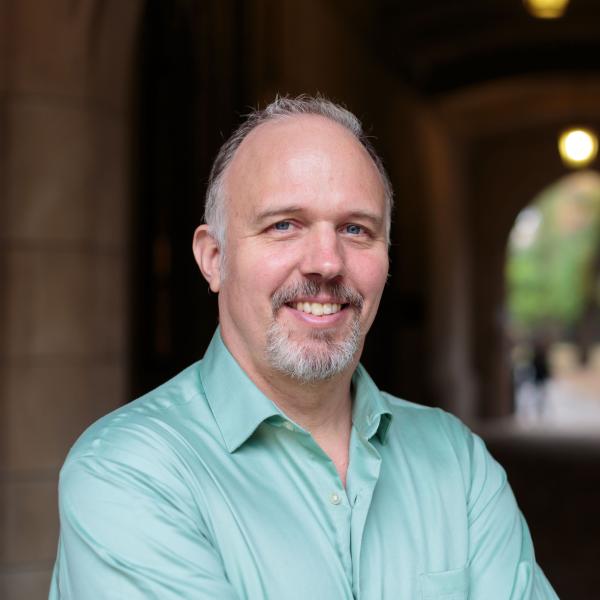
As a language teacher, I am committed to communicative and task-based methods of language learning. I am also highly interested in developing ever more effective ways to use media technologies in language acquisition. As a scholar, my interests include music and literature, time and temporality, as well as the various intersections of politics and aesthetics.
Academic Bio
I began teaching in the Department of Germanic Studies part-time in 2010, and I have been teaching here full-time since 2013. In the language classroom I consider my primary task to be to facilitate communication in the target language. I strive to create contexts and situations for students to exercise and expand their proficiency in all four skills (speaking, listening, writing, reading), on topics that spark their interest and creativity. In my time at the University of Chicago I have designed a number of new courses in the 2nd- and 3rd-year German sequence as well as upper-level electives. For example, I developed a new 2nd-year course on “Green Germany” based on a workshop I attended at the Center for Advanced Research on Language Acquisition (CARLA) in 2015 on “bringing sustainability and environmental themes into the language classroom.”
My course on “German in the German Imagination” (now “The Musical-Political Sublime”) grew out of a set of interrelated interests in music, aesthetics and critical theory, which I first developed in my dissertation and in articles on German Romantic authors (E. T. A. Hoffmann and Wilhelm Wackenroder). My interest in philosophical aesthetics is especially focused on how aesthetic programs are coordinated, overtly and covertly, with social and political agendas – for example, in an article on Kafka’s Josephine die Sängerin that explores “Kafka’s Intervention in Wagner’s Musical Politics.” The intersections of aesthetic and social concerns likewise form the theoretical matrix for another course I designed at the University of Chicago, “Berlin in Fragments,” which focuses on literature and the arts in the German metropole in the 1910s and 1920s.
Another long-standing focus of my intellectual endeavors has been time and temporality, a topic that includes the history of the philosophy of time, from Augustine to Derrida, as well as the ways in which literature and other arts shape the experience of time – thus overlapping with my interest in music. My most recent publication, “The Theater of Anamnesis: The Spaces of Memory and the Exteriority of Time in Wilhelm Meisters Lehrjahre,” is part of a larger, book-length project, which will interrogate the interiority of Romantic subjectivity by exploring the exteriority or spatiality of time in literature and music.
I am intensively involved with all aspects of the undergraduate program. I organize extracurricular events for students of German, including regularly recurring events such as the Kaffeestunde and Kinotag, and I serve as faculty adviser for the German Club as well as the German Honors Society – Delta Phi Alpha. I have also led a number of outings for students of German, including visits to the Lyric Opera to see Richard Wagner’s Tannhäuser and Richard Strauss’ Rosenkavalier; a German-language architecture tour of Chicago; a guided tour of an exhibit on German Expressionism at the Smart Museum. For the past two years, I have also participated in the annual German Immersion Day, a day-long series of workshops organized by a local consortium of colleges for all area students of German. I am committed to finding new ways to connect students’ study of German with the city of Chicago and with the wider world, also by inviting outside speakers. For example, a representative of the German-American Chamber of Commerce has come to give a talk to students in my “Green Germany” course. This year I will be organizing visits by the German Consul in Chicago and by the author Sabine Scholl, who will give a talk on “the integration of refugees and other immigrants into the literary scene in contemporary Germany.”
As Director of Undergraduate Studies I advise all majors and minors in Germanic Studies. I have advised B.A. papers on a variety of topics, including the architecture of Mies van der Rohe; Wagernerism in the Wilhelmine Era; the East German TV news-program Der schwarze Kanal; and an early 20th-century Austrian leader of the Pan-European Movement.
Courses Taught
Courses in language and literature/culture at all levels, including:
- German Fairy-Tales
- Green Germany: Transcultural Perspectives
- Short Fiction: Bad Romance in Contemporary German Literature
- Short Fiction: Detective Stories
- Short Fiction: The Reader
- Drama and Film: Romantic Renegades
- Drama and Film: Comedies of Deception
- German for Reading
- Berlin in Fragments
- Music in the German Imagination
Selected Publications
“The Theater of Anamnesis: The Spaces of Memory and the Exteriority of Time in Wilhelm Meisters Lehrjahre,” Goethe Yearbook 24, 2017, Special Section on the Poetics of Space in the Goethezeit.
“Notlagen: Kafka’s Intervention in Wagner’s Musical Politics,” The Germanic Review, Winter 2009.
Co-translator for Hannah Arendt: Reflections on Literature and Culture, Susannah Gottlieb, ed. (Stanford University Press, 2006)
“Dividing Time: Musical Memory and the Dis-closure of Fate in E. T. A. Hoffmann’s Die Automate,” Studies in Romanticism, Winter 2006.
Joseph Berglinger’s Musical Crucifixion: Harmony, Alterity, and the Theater of the Passions in the Writings of Wilhelm H. Wackenroder,’” Deutsche Vierteljahrsschrift für Literaturwissenschaft und Geistesgeschichte, March 2004.
